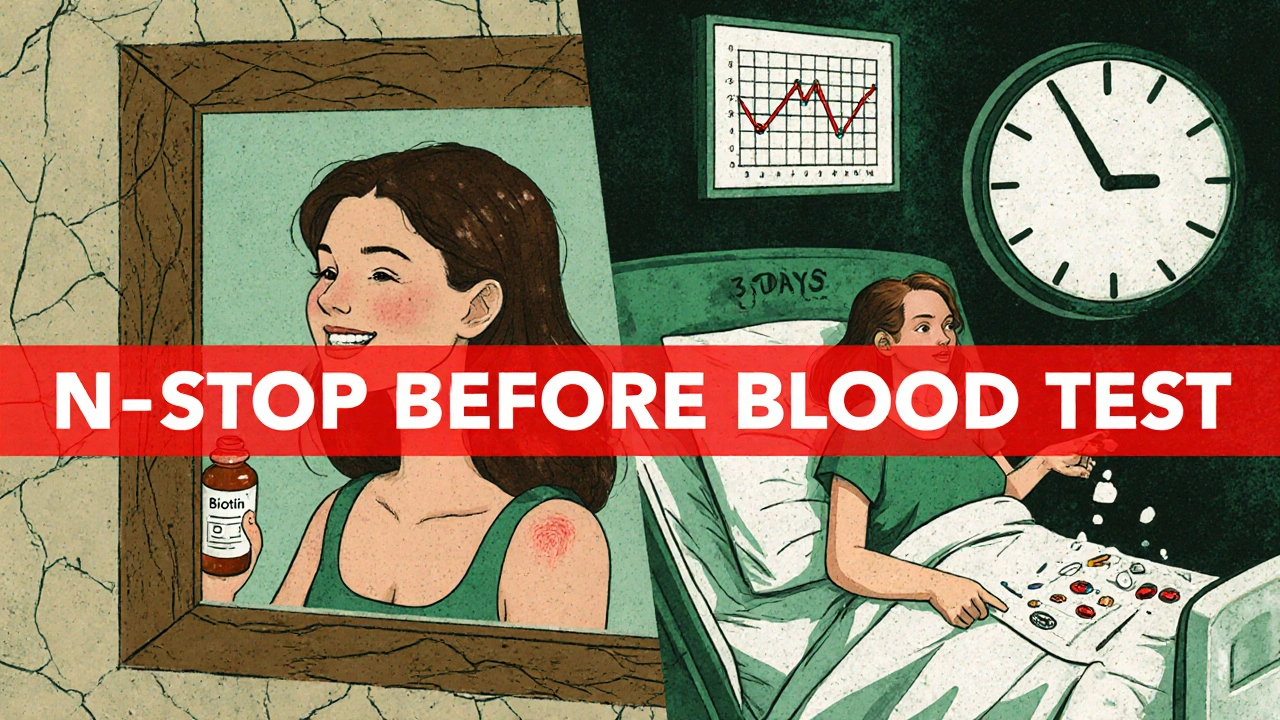Biotin Washout Period Calculator
High-dose biotin supplements can interfere with lab tests. Enter your biotin dose and test type to calculate the required washout period.
Every year, millions of people take biotin supplements hoping for stronger hair, clearer skin, or healthier nails. But what most don’t realize is that a daily pill labeled as "10,000 mcg" could be silently messing up critical lab tests - tests doctors rely on to catch heart attacks, thyroid disorders, and hormone imbalances. And when those tests give wrong answers, the consequences aren’t just inconvenient - they can be deadly.
What Exactly Is Biotin Doing to Your Lab Results?
Biotin, also known as vitamin B7, is a harmless nutrient your body needs in tiny amounts - about 30 micrograms a day. But supplements often contain 100 to 10,000 times that much. And here’s the problem: most automated lab tests - roughly 70% of them - use a technology called biotin-streptavidin binding to detect tiny amounts of hormones, proteins, and enzymes in your blood.
Think of it like a magnet and a metal key. The test uses biotin as a magnet to grab hold of the thing it’s trying to measure. But if you’ve taken a high-dose supplement, your blood is flooded with extra biotin. That extra biotin clogs up the system. It either blocks the test from detecting what it should (giving a falsely low result) or tricks it into thinking there’s more than there actually is (giving a falsely high result). And there’s no warning on the report. The machine just spits out a number - and doctors trust it.
The Most Dangerous Tests Affected
Some tests are far more vulnerable than others. The biggest red flag is cardiac troponin - the gold-standard blood test for heart attacks. If you’re taking high-dose biotin and your troponin level comes back falsely low, your doctor might think you’re fine when you’re actually having a heart attack. The FDA has documented cases where patients died because this happened.
Thyroid tests are another major risk. Biotin can make your TSH (thyroid-stimulating hormone) look artificially low, mimicking hyperthyroidism. I’ve seen cases where patients were diagnosed with Graves’ disease, prescribed radioactive iodine, and even had their thyroid removed - all because of a supplement they didn’t think mattered. Once they stopped biotin and retested, their numbers returned to normal. No disease. Just a lab error.
Other tests that can be thrown off include:
- Free T3 and free T4 (thyroid hormones)
- Cortisol (stress hormone)
- Parathyroid hormone (affects calcium levels)
- Follicle-stimulating hormone (FSH) and luteinizing hormone (LH) - critical for fertility and menopause diagnosis
- Vitamin D
These aren’t minor results. They guide life-changing decisions - whether to start hormone therapy, adjust medication doses, or rush into surgery. And the worst part? You won’t know it’s happening unless someone asks you about your supplements.
Who’s at Risk - And Who Isn’t
Not everyone who takes biotin is in danger. If you’re taking a standard multivitamin with 30-300 mcg of biotin, your risk is extremely low. That’s the amount your body needs. The real problem starts at 5 milligrams (5,000 mcg) and above.
That’s the dose found in most hair, skin, and nail supplements. It’s also the dose some multiple sclerosis patients take - up to 300 mg daily - under medical supervision. Even then, their doctors are usually aware of the risk and plan around it.
But here’s the gap: most people taking 10,000 mcg supplements aren’t patients. They’re healthy individuals scrolling through Instagram ads promising thicker hair. They don’t tell their doctors. They don’t read the fine print. And when they get bloodwork done - say, for a routine checkup or to investigate fatigue - the results are garbage.
How Long Does Biotin Stay in Your System?
It’s not gone after one day. Biotin has a half-life of 8 to 24 hours, depending on how much you took. That means if you take 10,000 mcg, it can stick around in your blood for 2 to 3 days.
Some labs say stop biotin 8 hours before your test. Others say 48 hours. Vanderbilt University Medical Center recommends 3 full days off for doses over 5 mg. For thyroid tests, they say wait 7 days.
There’s no universal rule. It depends on the lab, the test, and your dose. And unless your doctor knows you’re taking biotin, they won’t know to tell you to stop.
Why Do So Many People Not Know About This?
In 2022, a study of over 1,200 people taking high-dose biotin supplements found that 68% had no idea it could interfere with lab tests. Nearly 9 out of 10 never told their doctor they were taking it.
Why? Because supplement labels don’t warn you. A 2022 analysis of 200 top-selling biotin products found that only 37% mentioned lab test interference on the label. Most just say "supports healthy hair and nails." No mention of heart attacks. No mention of thyroid misdiagnosis. No mention of death.
Even worse, many doctors don’t know either. A 2020 study found that 43% of physicians had never heard of biotin interfering with lab tests. So when a patient comes in with weird hormone numbers, the doctor assumes it’s a real disease - not a supplement.

What You Should Do Right Now
If you’re taking any supplement with more than 5,000 mcg of biotin, here’s what to do:
- Check your bottle. Look at the Supplement Facts panel. If it says "Biotin: 10,000 mcg" or more, you’re at risk.
- Stop taking it. At least 3 days before any blood test. For thyroid tests, wait 7 days.
- Tell your doctor. Even if they don’t ask. Say: "I’m taking a biotin supplement. I want to make sure it doesn’t mess up my test results."
- Ask your lab. Call the lab where your blood will be drawn. Ask: "Do you test for biotin interference? What’s your recommended washout period?" Some labs have special protocols.
- Don’t restart until after your results. Wait until your doctor reviews your test and confirms everything looks normal before taking biotin again.
If you’re already scheduled for a test and forgot to stop, reschedule. It’s better to delay a test than risk a misdiagnosis.
What’s Being Done About It?
Things are slowly changing. In 2021, Health Canada started requiring supplement labels to say: "May interfere with laboratory tests" if they contain more than 100 mcg of biotin. The FDA now requires test manufacturers to include biotin interference warnings in their manuals.
Some labs are upgrading their equipment. Siemens Healthineers introduced a new technology in 2022 that blocks 90% of biotin interference. But it’s expensive, and not every lab has it yet.
Still, the problem is huge. An estimated 70 million lab tests in the U.S. each year use biotin-based technology. With nearly 1 in 10 U.S. adults taking biotin supplements - especially women in their 20s and 30s - this isn’t a rare edge case. It’s a widespread, preventable risk.
Final Thought: Your Health Isn’t a Guessing Game
Lab tests are meant to give you clarity. They’re supposed to tell you what’s wrong - not hide it behind a supplement you thought was harmless. Biotin isn’t the villain. It’s a nutrient your body needs. But when you take it in doses hundreds of times higher than your body can use, you’re playing with fire.
Don’t assume your doctor knows. Don’t assume your supplement label warns you. And don’t assume your test results are accurate if you’ve been taking high-dose biotin.
Ask the questions. Stop the supplement. Wait the time. Then get tested. That’s not being cautious - it’s being smart.

8 Comments
Sammy WilliamsNovember 21, 2025 AT 05:17
Bro i took 10k mcg biotin for 6 months for my hair and never thought twice. Got my thyroid checked last year and they said i had hyperthyroidism. I was freaking out, started researching, and turns out it was the supplement. Stopped it, waited 7 days, retested - normal. My doctor didn’t even ask about supplements. Wild how no one talks about this.
Julia StrothersNovember 22, 2025 AT 19:37
THIS IS A BIG PHARMA COVERUP. They don’t want you to know that biotin is a natural, cheap, safe vitamin that’s exposing how broken lab testing is. The FDA? Controlled by Big Lab. The supplement industry? They’re in bed with labs. They profit off misdiagnoses. Millions of people are getting thyroidectomies, heart meds, hormone therapies - all because corporations don’t want to update their 1990s tech. Wake up. The system is rigged.
Nikhil PurohitNovember 23, 2025 AT 10:00
So i read this and checked my bottle - yep, 10,000 mcg. I’ve been taking it for my nails since college. Never told my doctor. Now i’m scared to get bloodwork done. Should i just stop it cold turkey or taper off? Also, any advice on what to replace it with? I don’t want my hair to fall out but i also don’t want to die from a misdiagnosis lol.
Erika Sta. MariaNovember 24, 2025 AT 01:19
Ok but like… if biotin interferes with tests then why dont they just ban it? Why are we still allowed to buy it like candy? This is just capitalism being stupid. People are dying because some influencer on Instagram said "glow up with biotin" and now everyone’s popping pills like M&Ms. Also the fact that labs still use this outdated biotin-streptavidin tech? That’s like using a dial-up modem in 2024. Someone needs to get fired. Or maybe it’s all intentional. Maybe they want us sick so we keep buying meds. I’m not paranoid. I’m just observant.
Chris VereNovember 25, 2025 AT 16:41
This is a serious issue that deserves more attention. Many people take supplements without understanding their systemic effects. The disconnect between consumer behavior and medical reality is alarming. It is not merely a matter of personal choice but of public health infrastructure failing to adapt. We must demand transparency from manufacturers and education from providers. The cost of ignorance is measured in lives.
Pravin MananiNovember 26, 2025 AT 00:47
From a clinical perspective, the biotin-streptavidin interference is a well-documented analytical artifact. The binding affinity is in the 10^-15 M range - so even nanomolar concentrations of exogenous biotin saturate the assay. The 5mg threshold is conservative; some assays show interference at 1mg. Labs with newer platforms like Roche Elecsys or Abbott Architect have mitigated this, but most community labs haven’t upgraded. Bottom line: always disclose supplements, and if you're on >5mg, request a biotin interference panel or ask for a non-biotin-based assay. Pro tip: some labs now offer biotin level testing as an add-on.
Leo TamischNovember 27, 2025 AT 02:38
Wow. Just wow. 🤯 This is the kind of thing that makes me question everything. I mean, we live in a world where you can buy a pill that could literally cause your doctor to think you're having a heart attack… and nobody tells you? The fact that this isn’t front page news is proof that we’re all just NPCs in some corporate simulation. Also, if you're taking biotin, you're basically gambling with your life. And the worst part? You’ll never know you lost until it’s too late. 🧠💀
Franck EmmaNovember 28, 2025 AT 21:17
Stopped biotin. Got tested. Normal. Now I'm never touching it again. My doctor didn't even know. I'm lucky I'm alive.